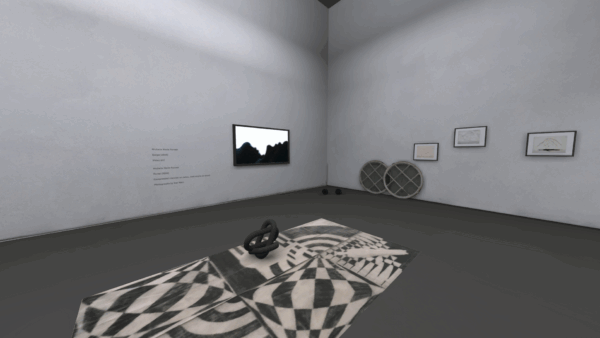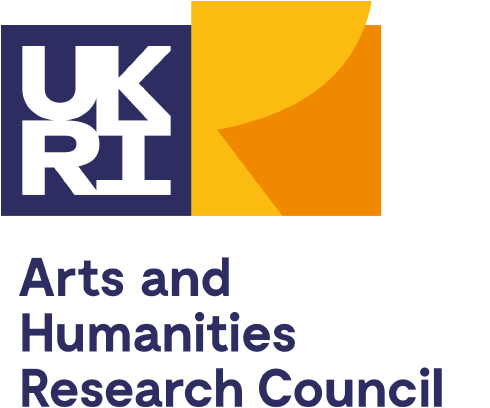Spike Island presents We are only partly real, a newly commissioned virtual exhibition by artists Steve Dutton and Michelle Marie Forrest.
Produced in collaboration with digital artist and researcher Stephen Gray, the commission seeks to explore the potential of Virtual Reality not only as a platform to exhibit art, but also as an artistic medium in itself.
Split into four interconnected zones, the virtual exhibition brings together real-world painting, drawing, sculpture and moving image; digital adaptations of real-world artworks; and new Virtual Reality artworks made specifically for this context. The result is a hybrid exhibition that uses Virtual Reality as a mechanism to explore artistic practice.
Inspired by their interest in the complexities of communication, Dutton and Forrest work with grids, data, text and colour, often embedding multiple references as cyphers within their work, to play with viewer’s feelings and memories. The exhibition draws upon various filmic references – including Victor Fleming’s The Wizard of Oz, David Lynch’s Twin Peaks, and Christopher Nolan’s Interstellar – using fantasy and surrealism as a means to investigate language and other forms of communication.
The notion of time is central to the commission, which features both a ‘daytime’ and ‘night-time’ version of the exhibition. Upon certain triggers, day turns into night, and viewers enter a dream-like state, where reality fades and imagination takes hold. This dual exhibition invites viewers to question their perception of reality, while acknowledging the potentials and pitfalls of Virtual Reality as a creative platform for both making and exhibiting art.
For the best experience, we recommend downloading the virtual exhibition to your computer. You can preview the lite version of the commission below. There is also a version of the exhibition that is accompanied by an audio guide narrated by the artists, sharing additional insight and context around individual artworks.
The virtual commission is a pilot project by Spike Island and researcher Stephen Gray, aiming to create new and accessible virtual art spaces. The project is funded by the University of Bristol’s AHRC Impact Acceleration Award, and curated by Spike Island’s Assistant Curator: Artist Development and Engagement, Saphia Abrahamovitch-Venner.
Steve Dutton
Steve Dutton (born Manchester, England, 1961) is an artist and occasional curator based in the South West of England, where he holds a studio at Spike Island in Bristol. His practice spans drawing, sound, moving image and text, with a focus on exploring the intersections and overlaps of language, space, and time. His work is characterized by its fluid movement between media and conceptual frameworks, engaging with the acts of reading, drawing, painting, speaking and writing, which could be referred to as a ‘language-based’ practice.
Individual and collaborative projects have been exhibited throughout the UK and Internationally. Recent exhibitions include, A Language Rematerialised at One Paved Court, London and the Fluxus Museum Experimental Video Prize, Greece. Publications included Fieldnotes Journal and Soanyway magazine. As an occasional co-curator, he is known for creating collaborative environments that challenge some of the conventions of the curatorial process.
In addition to his artistic practice, Dutton is an Emeritus Professor of Fine Art at Bath Spa University, and has held several Professorial and Research related appointments, including positions at the University of Lincoln, Coventry University and Sheffield Hallam University.
https://axisweb.org/artist/stevedutton
Michelle Marie Forrest
Michelle Marie Forrest (born in the North East of England, 1976) is an artist based in the South West of England. She describes her practice as centred on ‘making a scene’, in which she works with architectural forms, diagrammatic drawings, found objects, music and filmic references, to stage situations in which feelings of uncertainty and precarity are reflected upon.
Describing her approach as ‘psycho-techno-archaeological’, these mashups of technical methods and processes – active listening, pseudocode, fieldwork, visual cues – rupture and play with multiple perspectives and voices.
Working with matters which can range from the personal to the existential – broken hearts, financial instability, our place within the cosmos, the prospect of a multiverse – she explores and creates multiple overlaps and connections. What emerges is often simultaneously both a celebration and a shattering of the tenuous relationships between things.
Forrest has a First-Class Degree and a Masters with Distinction in Fine Art from the University of Lincoln. Recent exhibitions and projects include Identity, East Quay, Somerset; Recording and Documentation, Soanyway Magazine; Crisis Collective, Society Artistic Research, Norway; Critical Voices in Data, Control Shift, Bristol; a New Talent Artistic Researcher Data Fellow, SWCTN, Bristol; and Critical Mass / Sculpt Programme, Mark Devereux Projects. Forrest is also a member of Spike Island Associates.
www.mmforrestbeckett.com
Stephen Gray
Stephen Gray is an artist, designer and researcher based in Bristol. He works at the University of Bristol as both AHRC Research Fellow and Head of Research Support at the University of Bristol Library.
Stephen’s research is centred around the application of digital 3D technologies to provide immersive access to cultural heritage collections. This includes building virtual reality environments, 3D scanning artefacts and spaces, and interactive games design. Much of his research time is spent developing Uncertain Space, the University of Bristol’s virtual museum platform.
Stephen’s artwork is heavily influenced by ideas of hauntology and lost futures. He creates virtual reality environments using digital images, 3D models, digital audio and video. The result is a virtual archive of things that never were. As a neurodivergent person, Stephen has a special interest in the relationships between neurodivergent audiences and digital places.
https://www.electricityboard.org/






